Introduction
In the quest for sustainable energy sources, solar panels have emerged as a shining star. These photovoltaic wonders convert sunlight into electricity, offering a clean and renewable energy solution. With the global shift towards greener energy options, solar panels have become a popular choice for both residential and commercial applications. In this article, we will delve into the world of solar panels, exploring their pros, cons, and the bright future they promise.
Pros of Solar Panels
Renewable Energy Source: Solar panels harness the abundant and infinite power of the sun, making them a sustainable energy source. As long as the sun shines, you can generate electricity.
Environmentally Friendly: Solar energy production produces no greenhouse gas emissions, reducing your carbon footprint and contributing to a cleaner environment.
Lower Energy Bills: By generating your electricity, you can significantly reduce or even eliminate your energy bills, saving you money in the long run.
Energy Independence: Solar panels offer greater energy independence, reducing reliance on traditional energy sources and the grid.
Financial Incentives: Many governments and regions offer financial incentives, such as tax credits and rebates, to encourage solar panel installation, making it a cost-effective choice.
Increased Property Value: Homes and properties with solar panels often have higher resale values, making it a wise investment.
Low Maintenance: Solar panels are durable and require minimal maintenance, with most systems lasting 25 years or more.
Cons of Solar Panels
High Initial Costs:
The upfront cost of purchasing and installing solar panels can be substantial, although prices have been decreasing in recent years.
Weather Dependency:
Solar panels depend on sunlight, so energy generation may be limited on cloudy days or during the night. Battery storage systems can mitigate this issue.
Space Requirement:
Solar panels require a significant amount of space for installation, which may not be feasible for some properties.
Intermittent Energy Generation:
Solar power generation is intermittent, and excess energy may go unused or require costly storage solutions.
Aesthetic Impact:
Some homeowners may find solar panels unattractive or incompatible with the aesthetics of their homes.
Energy Conversion Efficiency:
Solar panels have a limited energy conversion efficiency, typically ranging from 15% to 20%.
Environmental Impact:
The manufacturing and disposal of solar panels can have environmental impacts, although recycling efforts are improving.
Pros and Cons of Solar Panels
This table provides a quick overview of the advantages and disadvantages of using solar panels, helping you make an informed decision about their adoption.
Conclusion
Solar panels represent a promising avenue for clean, renewable energy. The pros, including sustainability, cost savings, and environmental benefits, make them an attractive choice for many. However, the high initial costs, intermittent energy generation, and space requirements pose challenges. As technology continues to advance and costs decrease, solar panels are likely to play an increasingly significant role in our energy landscape. The decision to invest in solar panels should be based on your unique circumstances, energy needs, and environmental values. Solar panels can be a beacon of hope for a greener future, illuminating the path toward sustainable energy solutions.






